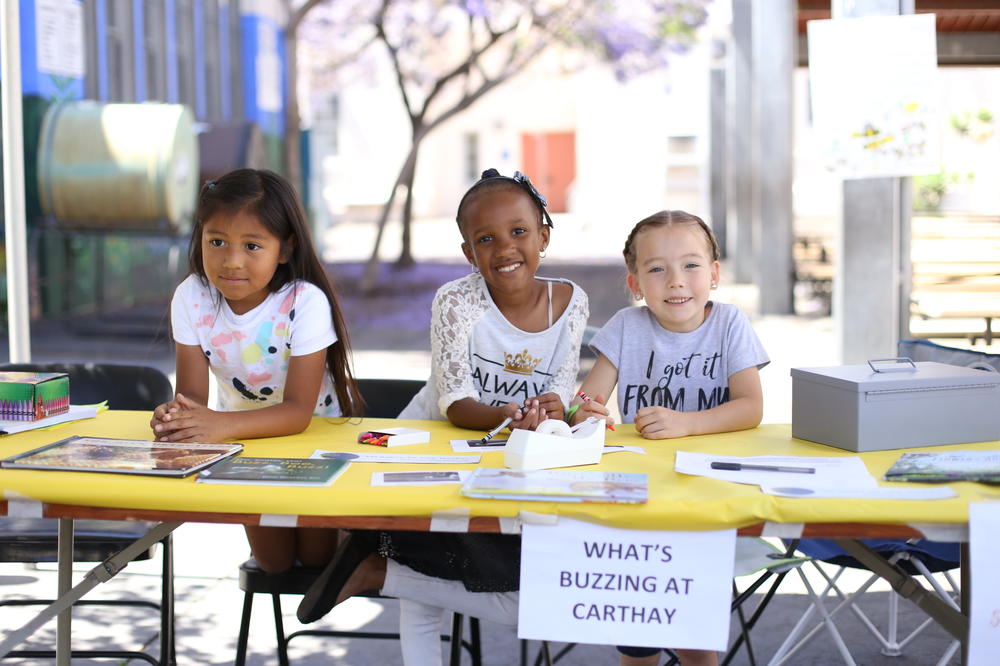Special Programs
Garden Science: In 2009, Carthay Center partnered with STAR Science to create a pilot Garden Science curriculum that connects California State Science Standards to hands-on, outdoor learning. This parent-funded initiative is a collaboration among Carthay Teachers, STAR Science Teachers, and Master Gardeners. The garden program at Carthay continues to expand as its success in supporting curriculum has proven to be an invaluable asset. The garden has invigorated learning on campus. Students love science and have become environmental stewards, healthier eaters, and keen observers of the natural world.
Gifted and Talented Education (GATE): Students can be officially identified for the GATE program as early as the end of 2nd grade, but typically identification occurs in 3rd grade. The student is referred to the GATE committee (which at Carthay consists of a teacher GATE coordinator, a parent, and the principal. Students whose abilities fall into one or more categories below may be considered for Gifted/Talented Programs.
- Intellectual Ability
- High Achievement
- Specific Academic Ability
- Creative Ability
- Leadership Ability
- Ability in the Performing or Visual Arts
State guidelines require that differentiated instruction for gifted and talented students build on the core curriculum and supplement it. Therefore, the gifted and talented “program” occurs within the student’s classroom. Differentiated instruction happens when the core curriculum is adapted and includes acceleration, pacing, levels of complexity, depth, and novelty, with expectations for student production that are suitable for individual interests, assessed needs, and abilities. Teachers receive professional development in educational programs that consider each student's interests, talents, and special abilities, providing opportunities for high-level thinking, creative expression, and self-understanding, often at a learning pace beyond the student's age or grade level as compared to that of their peers.
GATE at Carthay Center: In addition to differentiated instruction in the classroom, Carthay students in the GATE program attend special classes every Wednesday taught by instructors from STAR Education https://www.starinc.orgtion. The curriculum is project-based—experiential learning designed to inspire students, encourage their curiosity, and foster a lifelong passion for learning. Over 24 weeks, students explore four different topics, each consisting of 6 classes that vary by year.
Physical Education Classes: Students participate in weekly physical education classes with professional coaches who teach developmentally appropriate skills and ways to exercise and maintain healthy habits. Children in younger grades play games that develop skills—such as Sharks and Minnows, Frisbee, and Capture the Flag—while having fun and getting a workout. Children in older grades learn rules and skills for games like basketball, flag football, and soccer.
Young Storytellers: Young Storytellers is a creative writing and self-esteem program for 5th grade students. Mentor-screenwriters spend an hour a week helping 10 students learn the basics of storytelling and create their own 5-7 page screenplay. The program culminates with the “Big Show” and entertainment professionals act out the student’s screenplay. The belief is simple: “Every child has something to say!”
Reading Partners: Reading Partners is a national education nonprofit dedicated to improving students’ reading skills. Reading Partners works in Title I elementary schools to support students from low-income communities who are reading 1 month to 2.5 years below grade-level. Community volunteers are trained to work one-on-one with students for 45 minutes twice a week, following a structured, research-based curriculum.
Based on a data analysis of the impact of the program, Reading Partners has identified their "target population" as students in Kinder-4th grade who do not have an IEP (students with an IEP are usually already receiving additional, more individualized services delivered by a trained expert who has more impact than community volunteers that participate in Reading Partners). Students who are not in the target population may also participate in the program if volunteers are available, and, in the case of students with IEPs, if the teacher, principal, and resource specialist agree the program would be a good fit for the student.
Students are generally referred to Reading Partners by their teacher. If you believe your child would benefit from Reading Partners, the first step should be to speak to your child's teacher.
If you would like to be a Reading Partner volunteer at Carthay, you can sign up by filling out this form. Select Carthay from the drop-down menu.
Science fair and environmental exposition : In May, Carthay hosts a Science Fair and Environmental Exposition. Classes and students create science projects for the fair as well as a poster display. Concurrent with the Science Fair is an Environmental Exposition, with booths from groups throughout Los Angeles such as the Natural History Museum's BioSCAN project, Heal the Bay, the Theodore Payne Foundation, Grades of Green, the California Fuel Cell Partnership, the Ballona Wetlands Land Trust, LA Storm Water, STAR ECO Station, and many more.
Writers' Workshop: Students participate in Writers' Workshops to develop, write, illustrate, and celebrate their writing, following the research-based methods developed by Lucy Caulkins.
Art, dance, theater, & music: Each school year, LAUSD provides a rotating set of specialists to teach theater, dance, art, and music.
California Dance Institute: The CDI program https://www.californiadanceinstitute.org introduces children to the basics of movement, rhythm, and music through structured, energetic dance classes with live musical accompaniment, typically lasting 20-25 sessions at each school. Classes are held during school hours as part of the academic curriculum, usually targeting 3rd and 4th-grade students. Each class is led by a professional lead teacher, assistant teacher, and musician, all trained in National Dance Institute’s methodology. CDI enhances the school curriculum by working with classroom teachers on skill development, lesson topics, and visual art projects. Schools also receive a staff development workshop for all their teachers. Students perform in mid-point and final in-school shows for friends, family, and peers, and participate in a larger CDI performance with other schools in the spring.





